Events & Promotions
|
It is currently 23 Apr 2024, 04:32 |

Customized
for You
Track
Your Progress
Practice
Pays
09:55 AM PDT
-11:00 AM PDT
10:00 AM EDT
-10:30 AM EDT
10:00 AM PDT
-11:00 AM PDT
02:00 PM EDT
-03:00 PM EDT
03:00 PM PDT
-04:00 PM PDT
07:00 PM PDT
-08:00 PM PDT
| FROM Personal MBA Coach: Dartmouth Tuck Essay Advice: 2021-2022 |
|
Located in New England’s Upper Valley, [url=https://www.tuck.dartmouth.edu/mba]Dartmouth Tuck[/url] offers small-town charm while providing the resources of a larger area. If you are looking to attend a smaller MBA program but still want access to a cosmopolitan mix of cultures and global connections, Dartmouth Tuck may be a great choice for you. In the most recent reported class profile data, Dartmouth Tuck admitted applicants with an average GMAT score of 720 and an average undergrad GPA of 3.48. Information on the [url=https://www.tuck.dartmouth.edu/admissions/class-profile]class of 2022[/url] also notes that 49% of students identify as female and 37% of students have international citizenship. [b]In a statement detailing the 2021-2022 full-time MBA admissions criteria, Dartmouth Tuck shared the following:[/b] Tuck classes are diverse by design, but our students share four common characteristics that form the basis of our admissions criteria. Tuck students are smart, accomplished, aware and encouraging; no two candidates are equally strong across all criteria, and you may demonstrate different strengths in different ways. Once again, the school asks applicants to answer three required essay questions. This year, Tuck has kept essays 1 and 2 the same as the previous application cycle but has changed essay 3. Please see below for Personal MBA Coach’s tips on how to answer the Dartmouth Tuck essays. [img]https://www.personalmbacoach.com/wp-content/uploads/2020/10/blogs_posts-43cd84_d38c6ea1e0254b6ab00a9c72e4104000~mv2.png[/img] [b]Dartmouth MBA Essay Tips:[/b] [b]Essay 1:[/b] [b]Tuck students can articulate how the distinctive Tuck MBA will advance their aspirations. Why are you pursuing an MBA and why Tuck? (300 words maximum)[/b] There is a lot to fit into this short 300-word essay. First, candidates need to clearly articulate their goals, including both short-term and long-term aspirations. If you need help thinking through your goals, we have published [url=https://www.personalmbacoach.com/post/how-to-think-about-mba-goals]a blog[/url] with our general tips. Next, candidates should reflect upon the skills they will need to succeed in this desired career and SPECIFICALLY how Tuck will help them. Be sure to do your research into everything Tuck has to offer and discuss what you will take advantage of on campus and how. Tuck has a unique program, and it is more than just being close-knit. As always, avoid vague statements here. [b]Essay 2: Tuck students recognize how their individuality adds to the fabric of Tuck. Tell us who you are. (300 words maximum)[/b] For this question, candidates should reflect upon what makes them unique. Hobbies, passions, skills and aspirations are all fair game here. This essay also should paint a picture of what studying and living with you would be like and at least briefly discuss the role you will play within the class of 2024 and how you will improve life at Tuck. While Tuck no longer specifically asks candidates how they will contribute on campus, a strong answer will not completely ignore this discussion. Even though they removed this question, the mindset remains. Tuck would like to know how your uniqueness will add value on campus. [img]https://www.personalmbacoach.com/wp-content/uploads/2020/10/blogs_posts-43cd84_f13f395b8a964901b358b49e3a687f58~mv2.png[/img] [b]Essay 3: Tuck students are encouraging, collaborative and empathetic, even when it is not convenient or easy. Describe a meaningful experience in which you exemplified one or more of these attributes. (300 words maximum)[/b] While Tuck changed essay 3 for 2021-2022 applicants, the overall intention of the essay remains the same. Recognizing that actions speak louder than words, Tuck is looking to learn more about how you have demonstrated the school’s values. Naturally, the story selected should show speak to one or more of the aforementioned values, yet it should also be one that is easy to set up. You do not want to use many words explaining the situation; instead, you want to SHOW your actions. This question is yet another opportunity for candidates to allow the Tuck admissions directors to assess what studying and living with them would be like. Stories discussing volunteer and extracurricular work could be logical choices for this question. However, examples of how candidates exhibited these qualities in their personal or professional lives would work equally well. [b]Optional Essay:[/b] [b]Please provide any additional insight or information that you have not addressed elsewhere (e.g., atypical choice of evaluators, factors affecting academic performance, unexplained job gaps or changes). Complete this question only if you feel your candidacy is not fully represented by this application. (300 words maximum)[/b] Tuck also has an optional question that should be answered only by those candidates with unique circumstances. Read our advice on how to address optional questions [url=https://www.personalmbacoach.com/post/short-answer-optional-videos]here[/url]. [b]Reapplicant Essay: How have you strengthened your candidacy since you last applied? Please reflect on how you have grown personally and professionally. (300 words maximum)[/b] If you are reapplying, the Dartmouth Tuck application has a reapplicant essay question. Get Personal MBA Coach’s advice on how to tackle the reapplicant essay [url=https://www.personalmbacoach.com/tackling-the-mba-application-reapplicant-essay/]here[/url]. [b]About Personal MBA Coach:[/b] Founded by a Wharton MBA and MIT Sloan graduate who sits on the Association of International Graduate Admissions Consultants Board of Directors, [url=https://www.personalmbacoach.com/about/]Personal MBA Coach[/url] has been guiding clients for 14 years and is consistently ranked #1 or #2 by leading sources including Poets&Quants. We help clients with all aspects of the MBA application process including early planning, GMAT/GRE/EA tutoring, application strategy, school selection, essay editing and mock interviews. Our team includes former M7 admissions directors and former M7 admissions interviewers. Last year, our clients earned more than $6.5M in scholarships! The post [url=https://www.personalmbacoach.com/dartmouth-tuck-essay-advice/]Dartmouth Tuck Essay Advice: 2021-2022[/url] appeared first on [url=https://www.personalmbacoach.com]Personal MBA Coach[/url]. |
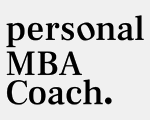
| FROM Personal MBA Coach: Yale MBA Essay Advice and Application Deadlines: 2021-2022 |
|
Yale School of Management has released deadlines and essays for the 2021-2022 application year, leaving their essay question unchanged for the sixth year in a row. As one of the smaller top MBA programs, Yale SOM’s intimate class size is a defining characteristic of the program, with 350 students enrolled in the class of 2022. Of these students, 39% identify as women, 40% are international passport holders, 10% are first-generation college students, and 8% identify as LGBTQ+. The class of 2022 came from a range of pre-MBA industries, the top three being financial services, consulting and non-profit. On average, students had an average of 4.5 years of work experience. The upcoming Yale MBA deadlines are as follows: Round 1: September 14, 2021 Round 2: January 6, 2022 Round 3: April 12, 2022  Bruce DelMonico, Assistant Dean for Admissions, has shared this advice to candidates in a previous blog post: We have one essay question: “Describe the biggest commitment you have ever made.” We developed this question in collaboration with Amy Wrzesniewski, a professor of organizational behavior at Yale SOM. Your time in business school, and the choices you make thereafter, represent significant commitments. In asking this question, the Admissions Committee is seeking to learn about how you have approached a commitment of importance in your life. When it comes to choosing a topic, be genuine. We want to hear about something that is meaningful and distinctive to you, in your own voice. Your commitment can be personal, specific or expansive. We receive outstanding, insightful essays covering a wide range of topics. The content of your essay is every bit as important as the topic. Regardless of the commitment that you choose, the most effective essays do a great job of describing your approach to commitment. Point to the specific actions that you have taken, over time, to bolster your commitment. This is especially important if you have chosen a broad topic, such as an ideal or a belief. Don’t just explain why a commitment is important to you; we want to understand how your behaviors have demonstrated and supported your commitment.  Personal MBA Coach’s Yale MBA Application Essay Tips: Essay: Describe the biggest commitment you have ever made. (500 words) As you craft your Yale SOM essay, keep in mind that Yale strives to “educate leaders for business and society.” With a passionate and committed student body, Yale takes pride in the small group learning teams and close-knit community. This question gives candidates a chance to provide admissions committee members with a glimpse of who they are and what matters to them, confirming they can and will live up to the school’s lofty mission. The commitment can be personal or professional, though I prefer to see candidates share personal experiences in their Yale MBA essays. Whatever you choose, be sure that you focus on ONE thing; do not include multiple commitments here. Past examples have included causes, personal development areas, athletic achievements and professional pursuits. The commitment can be something completed in the past or ongoing. However, if you select something that is ongoing, be sure that you have already made significant steps to deliver against your commitment. A commitment you just recently made and your forward-looking plans will not cut it here. Yale SOM wants to see passion, dedication and follow-through. They want to assess how you think and how you plan effectively. Your commitment should be something that genuinely matters to you. Remember, think leader for business AND society here. The most successful answers will show how you have delivered against this mission in the past. However, the commitment does not have to be focused on volunteer work. There are countless ways to make an impact on society. 500 words is fairly short and this is your main shot to show who you are and why you will fit in on campus. Be focused and be genuine! About Personal MBA Coach: Founded by a Wharton MBA and MIT Sloan graduate who sits on the Association of International Graduate Admissions Consultants Board of Directors, Personal MBA Coach has been guiding clients for 14 years and is consistently ranked #1 or #2 by leading sources including Poets&Quants. We help clients with all aspects of the MBA application process including early planning, GMAT/GRE/EA tutoring, application strategy, school selection, essay editing and mock interviews. Our team includes former M7 admissions directors and former M7 admissions interviewers. Last year, our clients earned more than $6.5M in scholarships! The post Yale MBA Essay Advice and Application Deadlines: 2021-2022 appeared first on Personal MBA Coach. |

| FROM Personal MBA Coach: NYU Stern Essay Advice and Application Deadlines: 2021-2022 |
|
For candidates who have their hearts set on relocating to (or remaining in) New York City, NYU Stern is a great option. This year, US News & World Report ranked NYU Stern the #10 Full-time MBA program and #4 Part-time MBA program. This past application cycle, NYU Stern admitted applicants with an average GMAT score of 723 and an average undergrad GPA of 3.60. The class of 2022 has an average of 5.2 years of pre-MBA work experience. Records also note that 43% of students are female and 32% of students have international citizenship. Unlike many other top programs, the NYU Stern Full-time MBA has a Round 2 application deadline in November. This option is great if you missed the Round 1 deadline but prefer not to wait until January to submit everything. The NYU Stern MBA application deadlines are: Round 1: September 15, 2021 Round 2: October 15, 2021 Round 3: January 15, 2022 Round 4: March 15, 2022 Please see below for Personal MBA Coach’s tips on how to answer the NYU MBA essays. Personal MBA Coach’s NYU Stern Essay Tips: “Our Stern essay questions give you the opportunity to more fully present yourself to the Admissions Committee and to provide insight into your experiences, goals, and thought processes.”  Essay 1: Change: _________ it (350 word maximum, double-spaced, 12-point font)In today’s global business environment, the only constant is change. Using NYU Stern’s brand call to action, we want to know how you view change. Change: _____ it. Fill in the blank with a word of your choice. Why does this word resonate with you? How will you embrace your own personal tagline while at Stern? Examples:
As you answer this question, pay careful attention to the opening: Stern lets you know it is looking to learn about your “experiences, goals, and thought processes.” This means both the what and the why are important here. As you pick a tagline, be sure to consider why this approach to change is meaningful to you. Naturally, you should be able to connect it to a part of your experience. Show the reader how you have lived this tagline. It is also crucial that you cover what you will do moving forward, both at NYU Stern and beyond! Tell the reader HOW you will drive change. There is a lot to cover here so use your words carefully and avoid cliches. Essay 2: Personal Expression (a.k.a. “Pick Six”): Describe yourself to the Admissions Committee and to your future classmates using six images and corresponding captions. Your uploaded PDF should contain all of the following elements:
If you are seeking NYU Stern Pick Six examples, know that there are no wrong answers here as this is your chance to let the reader into your world. You do want to include a well-rounded mix of photos that tell the reader more about you. While a mix of personal and professional photos can work well, some candidates will include only personal details. Think about what makes you unique and what values drive you as you select these images. Finally, follow the directions. One sentence is ONE sentence. Have fun with this and feel free to be creative. 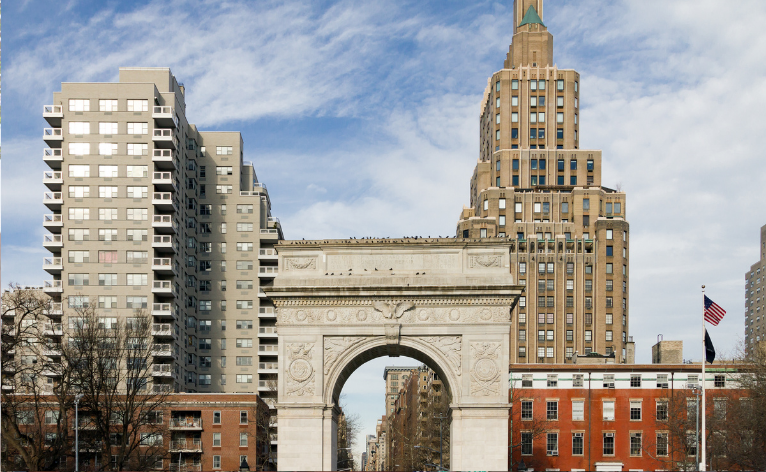 Essay 3: Additional Information (optional) (250 word maximum, double-spaced, 12-point font) Please provide any additional information that you would like to bring to the attention of the Admissions Committee. This may include current or past gaps in employment, further explanation of your undergraduate record or self-reported academic transcript(s), plans to retake the GMAT, GRE, Executive Assessment, IELTS or TOEFL, or any other relevant information. For tips on handling the third (optional) NYU MBA essay, review this blog from Personal MBA Coach. Along with the NYU Stern full-time MBA, those interested in NYU Stern also can pursue a Fashion & Luxury MBA, Tech MBA, Executive MBA, or Part-time MBA. About Personal MBA Coach: Founded by a Wharton MBA and MIT Sloan graduate who sits on the Association of International Graduate Admissions Consultants Board of Directors, Personal MBA Coach has been guiding clients for 14 years and is consistently ranked #1 or #2 by leading sources including Poets&Quants. We help clients with all aspects of the MBA application process including early planning, GMAT/GRE/EA tutoring, application strategy, school selection, essay editing and mock interviews. Our team includes former M7 admissions directors and former M7 admissions interviewers. Last year, our clients earned more than $6.5M in scholarships! The post NYU Stern Essay Advice and Application Deadlines: 2021-2022 appeared first on Personal MBA Coach. |

| FROM Personal MBA Coach: Chicago Booth Essay Analysis and Application Deadlines: 2021-2022 |
|
The Chicago Booth essay questions have been confirmed for 2021-2022 applicants. This year, both questions have remained unchanged. There are two Chicago Booth essays, each with no strict word limit. Chicago Booth’s Full-Time MBA Program is known for its analytical approach, and many economists teach courses on theory and practice. The program offers a multidisciplinary core curriculum, covering accounting, economics, psychology, sociology, and statistics. With no major requirements, students have great flexibility in choosing courses. If you are looking to apply for 2022 intake, please see below for the upcoming deadlines as well as Personal MBA Coach’s tips on how to answer the Chicago Booth MBA essays. The Chicago Booth MBA deadlines are: Round 1: September 23, 2021 Round 2: January 6, 2022 Round 3: April 7, 2022  Personal MBA Coach’s Booth MBA Essay Tips: Essay 1: How will the Booth MBA help you achieve your immediate and long-term post-MBA career goals? (250-word minimum) For this question, you will want to discuss your specific short-term and long-term goals. Be sure to explain a bit of your thinking behind these goals, allowing the reader to understand both your higher-level aspirations and how you developed them. As with other “goals” essays, you are also expected to touch upon your past successes, explaining how they are relevant to your future objectives. This question does not require you to walk through your entire resume, and candidates are advised not to do so. Instead, focus only on your past to establish your key skills as well as how and why you will succeed in the future. Next, think about your skills gaps and how a Booth MBA will help you to close these gaps. Be specific here and take the time to do your research. Detail the classes, programs, or clubs you hope to take advantage of on campus and how they will help you to achieve your post-MBA career goals. Again, do not include a laundry list. Instead, carefully think through how each area will help you fill in the necessary pieces of the puzzle. Finally, be sure to show an understanding of Booth’s culture.  Essay 2: An MBA is as much about personal growth as it is about professional development. In addition to sharing your experience and goals in terms of career, we’d like to learn more about you outside of the office. Use this opportunity to tell us something about who you are… (250-word minimum) The second Chicago Booth essay challenges applicants to think about personal aspects of their profile. At Personal MBA Coach we specialize in helping our clients develop their personal stories. This essay is an opportunity to share more about yours. As you brainstorm topics for this Booth MBA essay, remember that admissions committees are looking to create a well-rounded class. Think about how you are unique. This is your chance to think about what sets you apart from other applicants. Potential topics to explore here include passions, values, hobbies, and extracurricular activities. However, be careful not to copy your Kellogg essay when discussing values if you are applying to both schools. While there is no stated maximum for the Chicago Booth essay questions, we advise our clients to be focused and succinct. This is not the time to write a 1,000-word essay, so choose your words carefully. Optional Essay: Is there any unclear information in your application that needs further explanation? If so, please use this section to clarify. (350 words maximum) The Chicago Booth application also includes an optional essay question. For tips on handling this third (optional) Booth MBA essay, visit Personal MBA Coach’s blog on optional essays. About Personal MBA Coach: Founded by a Wharton MBA and MIT Sloan graduate who sits on the Association of International Graduate Admissions Consultants Board of Directors, Personal MBA Coach has been guiding clients for 14 years and is consistently ranked #1 or #2 by leading sources including Poets&Quants. We help clients with all aspects of the MBA application process including early planning, GMAT/GRE/EA tutoring, application strategy, school selection, essay editing and mock interviews. Our team includes former M7 admissions directors and former M7 admissions interviewers. Last year, our clients earned more than $6.5M in scholarships! The post Chicago Booth Essay Analysis and Application Deadlines: 2021-2022 appeared first on Personal MBA Coach. |

| FROM Personal MBA Coach: 5 Tips for Preparing Your Recommenders |
|
Letters of recommendation are an integral part of your MBA application that require more work than you might think. We often hear of candidates who ask someone to write the letter, ensure it gets submitted, and call it a day. This can be a big mistake! Your role in the MBA letter of recommendation process should be much more involved than this. See our tips on arming your recommenders to write the best letters possible. If you haven’t already selected your recommenders, check out our blog on this as well! 1. Share your career aspirations The more your recommenders know about your short-term and long-term goals, the more they can highlight examples and skill sets that would best demonstrate your ability to succeed in these endeavors.  2. Tell your recommenders what you have discussed/plan to discuss in your essays Offer them a copy of your essays or at least share the highlights from what you wrote. Beyond your goals, let them know the traits you are highlighting and the success stories you are telling. The idea is for the letter to complement the rest of your application. This means you do not want them to repeat exactly what you are already saying, yet at the same time, you want to make sure there is no conflicting information. If they have a sense of your stories, they will be better equipped to share examples of accomplishments that demonstrate a complementary skill set or touch on an area you were not able to cover in your essays. The more they know about what you are already writing about, the more successful this will be. 3. Remind your recommenders of your key accomplishments Don’t be shy about reminding them of your successes. This will not only make their lives easier but it will ensure they share the best stories. Your recommenders are busy and it is easy for them to forget details. Take the time to think of the top stories you would like them to recount and remind them of your role in certain projects or assignments. 4. Model the behavior now that you want them to write about later If you have a skill set your future recommender hasn’t seen yet (especially one that fits with your story), now is the time to let it shine! Take on an extra project, sign up to volunteer within the organization or mentor a junior colleague. Whatever you can do to show your strengths (particularly if you are starting early!) will help ensure they have enough examples to write a glowing letter of recommendation. Keep this in mind when you are at the office or client site at 8 PM and debating whether to leave or burn the midnight oil.  5. Remind them to compare you to other candidates Just as we advise that your resume and essays should go beyond listing tasks, your recommendations should go beyond recounting what you have done. Successful MBA students are leaders who have differentiated themselves from their peers, going above and beyond what would be expected in the role. One of the best ways to show this is to compare you to your peers and others who have had the job previously. About Personal MBA Coach: Founded by a Wharton MBA and MIT Sloan graduate who sits on the Association of International Graduate Admissions Consultants Board of Directors, Personal MBA Coach has been guiding clients for 14 years and is consistently ranked #1 or #2 by leading sources including Poets&Quants. We help clients with all aspects of the MBA application process including early planning, GMAT/GRE/EA tutoring, application strategy, school selection, essay editing and mock interviews. Our team includes former M7 admissions directors and former M7 admissions interviewers. Last year, our clients earned more than $6.5M in scholarships! The post 5 Tips for Preparing Your Recommenders appeared first on Personal MBA Coach. |

| FROM Personal MBA Coach: Duke MBA Essay Advice and Application Deadlines: 2021-2022 |
|
Duke Fuqua has confirmed its essay questions for 2021-2022 MBA hopefuls. Both required essays have remained the same this year, though the word count has increased for the second essay. For those interested in applying to Duke Fuqua, the school offers an early action deadline, along with three regular rounds. The Duke Fuqua MBA Application Deadlines Are: Early Action: September 2, 2021 Round 1: October 11, 2021 Round 2: January 5, 2022 Round 3: March 24, 2022 Please see below for Personal MBA Coach’s tips on how to answer the Duke MBA essays. Personal MBA Coach’s Duke Fuqua Essay Tips: In addition to a required short answer question: What are your post-MBA career goals? Share with us your first choice career plan and your alternate plan, Duke asks applicants to answer two essay questions. Essay 1: 25 Random Things About Yourself The ‘Team Fuqua’ spirit and community is one of the things that sets the MBA experience apart, and it is a concept that extends beyond the student body to include faculty, staff, and administration. Please share with us “25 Random Things” about you. The Admissions Committee wants to get to know YOU – beyond the professional and academic achievements listed in your resume and transcript. Share with us important life experiences, your hobbies, achievements, fun facts, or anything that helps us understand what makes you who you are. Your list will be limited to 2 pages (750 words maximum). Please present your response in list form, numbered 1 to 25. Some points may be brief, while others may be longer. With this first Duke Fuqua essay, be yourself and have fun. The majority of this essay should be personal, including hobbies, passions and interesting facts. These facts do not need to be formal. This is your chance to show how you are unique. There are no wrong answers here, but Personal MBA Coach advises that clients limit repetition and do not include a lot of professional details. Check out these examples from Duke to get some additional inspiration!  Essay 2: The Fuqua Community and You Fuqua prides itself on cultivating a culture of engagement. Our students enjoy a wide range of student-led organizations that provide opportunities for leadership development and personal fulfillment, as well as an outlet for contributing to society. Our student-led government, clubs, centers, and events are an integral part of the student culture and to the development of leaders. Based on your understanding of the Fuqua culture, what are 3 ways you expect to contribute at Fuqua? Your response will be limited to 1 page (500 words maximum). For this Duke MBA essay, pick only THREE things. An ideal answer will show that you are a well-rounded and engaged citizen and will act this way as well once you get on campus. They want to see that you did your research and really know why you want to go to Duke and how you will improve the community. You should include a mix of what you have done in the past AND specifically how you will be active on campus. In addition to discussing the Fuqua culture, you should specifically mention how you will be involved on campus. Name specific clubs you might join, programs you hope to establish and/or ways you would like to become involved in the broader community. Despite the fact that Duke Fuqua shortened this essay, it is particularly important to Fuqua that candidates have clearly thought through their unique roles on campus, so be sure to devote plenty of time to research for this essay!  Optional essay: Tell us more If you feel there are circumstances of which the admissions committee should be aware, please explain them here (e.g. unexplained gaps in work, choice of recommenders, inconsistent or questionable academic performance). Note that you should NOT upload additional essays nor additional recommendations in this area. The Optional Information section is intended to provide the admissions committee with insight into your circumstances only. Instructions: Your response will be limited to 1 page (500 words maximum). Duke Fuqua also has an optional essay. However, DO NOT feel compelled to answer this application essay. In most instances, Personal MBA Coach advises candidates only with extenuating circumstances (i.e., low GPAs or gaps in employment) to provide additional information here. About Personal MBA Coach: Founded by a Wharton MBA and MIT Sloan graduate who sits on the Association of International Graduate Admissions Consultants Board of Directors, Personal MBA Coach has been guiding clients for 14 years and is consistently ranked #1 or #2 by leading sources including Poets&Quants. We help clients with all aspects of the MBA application process including early planning, GMAT/GRE/EA tutoring, application strategy, school selection, essay editing and mock interviews. Our team includes former M7 admissions directors and former M7 admissions interviewers. Last year, our clients earned more than $6.5M in scholarships! The post Duke MBA Essay Advice and Application Deadlines: 2021-2022 appeared first on Personal MBA Coach. |

| FROM Personal MBA Coach: MIT MBA Application Advice and Deadlines: 2021-2022 |
|
This year, the MIT Sloan application remains nearly same as the previous cycle, with one small change. Again, the school requests that applicants submit a cover letter, organizational chart and 60-second video statement as part of their application. This year, however, applicants are asked to address their cover letters to the admissions committee as a whole, rather than specifically to the assistant deans of admissions. Below, please find this year’s 2021-2022 application deadlines along with Personal MBA Coach’s advice on how to tackle the MIT Sloan application. The MIT Sloan Application Deadlines Are: Round 1: September 28, 2021 Round 2: January 19, 2022 Round 3: April 12, 2021 MIT Sloan Cover Letter: MIT Sloan seeks students whose personal characteristics demonstrate that they will make the most of the incredible opportunities at MIT, both academic and non-academic. We are on a quest to find those whose presence will enhance the experience of other students. We seek thoughtful leaders with exceptional intellectual abilities and the drive and determination to put their stamp on the world. We welcome people who are independent, authentic, and fearlessly creative — true doers. We want people who can redefine solutions to conventional problems, and strive to preempt unconventional dilemmas with cutting-edge ideas. We demand integrity and respect passion. Please visit the website for frequently asked questions. Taking the above into consideration, please submit a cover letter seeking a place in the MIT Sloan MBA program. Your letter should conform to a standard business correspondence, include one or more professional examples that illustrate why you meet the desired criteria above, and be addressed to the Admissions Committee (300 words or fewer, excluding address and salutation). Those applicants wondering how to get into MIT Sloan should keep in mind that the MIT cover letter requires quite a different approach from other MBA application essays. Candidates really need to reflect on their most significant accomplishments here and make it clear what they will bring to the table once they arrive at Sloan. We actually advise Sloan MBA candidates to approach this cover letter as they would any professional cover letter. Ask for a place in the MIT Sloan class and tell the reader who you are. This is not the time to repeat your resume but, as with any cover letter, provide greater depth to your character and accomplishments. With such a short length, you will need to choose each word carefully and select the most compelling stories to tell. Think about MIT’s values as you write this letter and consider instances where you exhibited innovative thinking and leadership. Finally, note SPECIFICALLY how you will bring this experience to the MIT Sloan MBA program and how you will use it to create meaningful contributions within the community.  MIT Sloan Video Statement: Introduce yourself to your future classmates. Here’s your chance to put a face with a name, let your personality shine through, be conversational, be yourself. We can’t wait to meet you! Videos should adhere to the following guidelines:
In your MIT Sloan MBA video essay, you should introduce yourself to your future classmates, tell us about your past experiences, and touch on why MIT Sloan is the best place for you to pursue your degree. For the video component of your MIT Sloan MBA application, it is most important to be yourself. This is a chance for admissions committee members to evaluate applicants’ physical presence and delivery. Additionally, it provides an opportunity to learn more about you both personally and professionally. Keep in mind the direct request to address why MIT Sloan is a good fit. For this section of the video, candidates should be specific, thinking about particular aspects of the MBA program that appeal to them. With a lot to cover in one minute, be sure you strike a careful balance between talking about yourself and explaining your desire to attend MIT Sloan. While you do not want to memorize the video statement and sound overly rehearsed, we do advise candidates to write out a rough script in advance of filming and to practice multiple times! Consider factors such as audio quality, demeanor, and fluency in addition to the content itself. Personal MBA Coach includes analyses of sample videos in its comprehensive packages.  MIT Sloan Organizational Chart: Our goal is to learn about you and your professional background. Your employer’s organizational chart will help us better understand the role you play within your organization, who you report to, and the impact you might have on your department or company. Some important details:
Click here to view a sample MIT organizational chart. There is no right or wrong format for the organizational chart. The key is that is it easy to follow and understand and shows your direct reports (if any) and who you report to. Most companies should have a chart that you can work from. About Personal MBA Coach: Founded by a Wharton MBA and MIT Sloan graduate who sits on the Association of International Graduate Admissions Consultants Board of Directors, Personal MBA Coach has been guiding clients for 14 years and is consistently ranked #1 or #2 by leading sources including Poets&Quants. We help clients with all aspects of the MBA application process including early planning, GMAT/GRE/EA tutoring, application strategy, school selection, essay editing and mock interviews. Our team includes former M7 admissions directors and former M7 admissions interviewers. Last year, our clients earned more than $6.5M in scholarships! The post MIT MBA Application Advice and Deadlines: 2021-2022 appeared first on Personal MBA Coach. |

| FROM Personal MBA Coach: Personal MBA Coach’s Take on the Fortune MBA Rankings |
|
Fortune magazine recently released its full-time MBA rankings for the Best MBA Programs of 2021. While sources like the Financial Times and US News and World Report have been sharing MBA rankings for years now (check out Personal MBA Coach’s take on the Financial Times and US News and World Report rankings), this is Fortune’s first time sharing a list of its own. Although business school rankings are only one part of the MBA decision-making process, they provide a great overview of the business school landscape, as well as some valuable benchmarking information. When evaluating business school rankings, it is key to remember that rankings vary from source to source and across industries and should not be the be-all and end-all. So, how do the top US business schools stack up in the Fortune MBA rankings? Personal MBA Coach shares an overview, as well as some of our main takeaways, below. [img]https://www.personalmbacoach.com/wp-content/uploads/2021/07/WordPress-–-Fortune-Rankings-Blog-copy.png[/img] Fortune’s Best MBA Programs of 2021 Unsurprisingly, Harvard, Stanford, and Wharton have secured the top three spots, in that order. Following close behind are Chicago Booth (#4), Kellogg (#5), and Columbia Business School (#6). NYU Stern secured the #7 spot in the Fortune MBA Rankings, followed by MIT Sloan (#8). Yale School of Management (#9) and Dartmouth Tuck (#10) closed out the top 10. Interestingly enough, Berkeley Haas is not in Fortune’s top 10, instead taking the #13 place. This is unusual, as Haas is often found in the top 10 within the traditional MBA ranking sources. While Fortune’s top 10 list was quite predictable overall, the Fortune MBA rankings get more interesting as you look at the top 25 business schools. Perhaps the most noteworthy surprise is that Michigan Ross, UCLA Anderson, USC Marshall, and Emory Goizueta are not on Fortune’s list, as they opted not to complete Fortune’s questionnaire. Given that these schools are typically found in the top 25 rankings, their absence certainly does not go unnoticed. Fortune’s ranking methodology has faced some criticism. Starting salaries and placement stats account for 65% of the ranking. As Poets&Quants notes, this is almost twice the weight that US News and World Report and Bloomberg Businessweek place on salary and placement. Fortune’s ranking place a lower weight on the quality of the MBA experience, a key component in the decision-making process. [img]https://www.personalmbacoach.com/wp-content/uploads/2021/07/WordPress-–-Fortune-Rankings-Blog-copy-2.png[/img] Poets&Quants also points out that Fortune’s list favors the more elite business schools with larger graduating classes. While some of the other top sources for MBA rankings reflect the growing number of high-quality MBA options, the Fortune MBA rankings prioritize the M7s. Keep in mind that these days, many applicants are looking at a broader list of target business schools. In fact, Personal MBA Coach’s clients apply to 5 to 8 schools on average, and some of the smaller programs have been receiving a lot more attention in recent years. Again, business school rankings are only part of the school selection process. Be sure to also pay close attention to curriculum and specific areas of excellence at the programs you are considering. Specifically, think carefully about your post-MBA goals and whose offerings are the best fit for you. Are you looking for more guidance on school and program selection? Download Personal MBA Coach’s free Decision Making eBook today! You may also like Personal MBA Coach’s most recent feature in Fortune Education, 6 MBA admissions trends during the pandemic. Stay tuned for another feature of ours in the magazine later this summer! About Personal MBA Coach: Founded by a Wharton MBA and MIT Sloan graduate who sits on the Association of International Graduate Admissions Consultants Board of Directors, Personal MBA Coach has been guiding clients for 14 years and is consistently ranked #1 or #2 by leading sources including Poets&Quants. We help clients with all aspects of the MBA application process including early planning, GMAT/GRE/EA tutoring, application strategy, school selection, essay editing and mock interviews. Our team includes former M7 admissions directors and former M7 admissions interviewers. Last year, our clients earned more than $6.5M in scholarships! The post Personal MBA Coach’s Take on the Fortune MBA Rankings appeared first on Personal MBA Coach. |

| FROM Personal MBA Coach: How to Maximize Your Chance for an MBA Scholarship |
|
With the cost of tuition at some of the top MBA programs topping US$80,000 per year, financing an MBA can be challenging. And while many MBA students take out graduate student loans to fund their studies, MBA scholarship money, though somewhat elusive, is available every application year. In fact, Personal MBA Coach’s clients earned over $6.5M in scholarships last year! Below, Personal MBA Coach shares our tips for maximizing your chances of scholarship success! First, let’s discuss the basics of MBA scholarships. MBA scholarships, sometimes referred to as MBA fellowships, fall into two major categories: 1. Merit-based money offered as a result of the MBA application. The vast majority of scholarship money is offered based on your original MBA application. In these instances, candidates do not submit additional materials to be considered and schools offer money to candidates they are trying to attract (often away from other schools). This money can come directly from the school itself, having nothing to do with the applicant’s specific demographic or professional background. Or the scholarship may be in collaboration with another organization. While this other organization may suggest guidelines for consideration, the admissions committee members ultimately make the final scholarship decisions. For example, one of our partners, the Forté Foundation, gives the following guidelines to admissions directors selecting Forté MBA Fellowship recipients:
 2. MBA scholarships that students apply for directly. These scholarships generally target specific candidates based on industry, ethnicity, gender, etc. A separate application is required for each of these scholarships, and specific criteria apply. Examples include: The Consortium (note: you can also apply to participating schools through the scholarship application): Since 1966, we have offered more than $465 million in fellowships to the best and brightest MBA students in the country. We have programs that cover full tuition and mandatory fees for two years of full-time study (Emory also offers a one-year program). NBMBAA (National Black MBA Association): NBMBAA is positioned to help the Black community reach the highest levels of academia, increase lifetime median income potential and reduce unemployment rates among the Black community. With 20,000 members in 40 professional Chapters, we strive to increase awareness and facilitate access to graduate and business education programs in professional fields. NSHMBA/Prospanica (The National Society of Hispanic MBAs): Since our founding as the National Society of Hispanic MBAs in 1988, we’ve hosted annual career and professional development conferences, connecting thousands of Hispanics to graduate programs, subject matter experts, corporations, and each other. Prospanica has given over $8 million in scholarships for graduate education, and many of those recipients have led our professional chapters and university chapters across the US and Puerto Rico, advancing diversity causes in their own communities. In 2016, as Hispanics continued to occupy a growing portion of the nation’s demographics, we rebranded as Prospanica to broaden our mission to serve all Hispanic professionals. Now that you know the basics about MBA Scholarships, find out what you can do to maximize your chances of earning one of these coveted scholarships.  Here are 4 key MBA Scholarship tips from Personal MBA Coach. 1. Ensure your application stands out! The good news for candidates hoping to receive a scholarship is that the same advice Personal MBA Coach provides on developing stand-out applications applies to developing scholarship-winning applications (which is why our clients earn significant MBA scholarships). Admissions directors are tasked with selecting diverse and well-rounded classes. For candidates seeking scholarships, it is particularly crucial that your application tells a solid story about how you will uniquely add value on campus. 2. Court your target schools. MBA admissions directors have limited funds to distribute. They do not want to waste these funds on candidates not truly interested in their programs. Therefore, while it is not required, getting to know a school can help your chances of receiving an MBA scholarship. While COVID-19 is still restricting campus visits, MBA hopefuls have multiple other options for reaching out to and connecting with their target MBA programs. In the best-case scenario, you can utilize these virtual offerings to build rapport with an admissions representative and directly improve your chances of earning a scholarship. Even if this does not happen, attending online events and interacting with the school you hope to attend will give you valuable material to use as you develop standout essays. Remember, students can also be a valuable resource since admissions directors may not be as available to chat with you.  3. Submit your applications as early as possible. With a limited amount of money to go around, the earlier you apply, the better. Schools want to be sure that their classes are filled with well-rounded students and are more likely to use scholarships to ensure this earlier in the process. By round 3, less money is left. That said, scholarship money is sometimes offered later in the year as additional funding becomes available. 4. Excel in as many areas as possible. While this may seem obvious, Personal MBA Coach often sees candidates who have a decent GMAT, GRE or EA score yet have not maximized their scores. If you took the test just once or twice and/or did little preparation, consider getting a tutor to reach your full potential! Similarly, we see candidates who do not want to dedicate time outside of the office to beef up their extracurricular profiles. While Personal MBA Coach always advises that candidates develop well-rounded portfolios, this is particularly crucial for those looking for an MBA scholarship. Scholarship recipients most often excel in multiple areas. About Personal MBA Coach Founded by a Wharton MBA and MIT Sloan graduate who sits on the Association of International Graduate Admissions Consultants Board of Directors, Personal MBA Coach has been guiding clients for 14 years and is consistently ranked #1 or #2 by leading sources including Poets&Quants. We help clients with all aspects of the MBA application process including early planning, GMAT/GRE/EA tutoring, application strategy, school selection, essay editing and mock interviews. Our team includes former M7 admissions directors and former M7 admissions interviewers. Last year, our clients earned more than $6.5M in scholarships! The post How to Maximize Your Chance for an MBA Scholarship appeared first on Personal MBA Coach. |

| FROM Personal MBA Coach: Three Notable Takeaways from the Wharton MBA Class of 2023 Profile |
|
The Wharton class profile for the class of 2023 was recently released. While these facts and figures get a lot of attention each year, this year there were some particularly significant changes, signaling three trends Personal MBA Coach expects to continue. 1. The number of female students is on the rise. For the first time in Wharton’s history, women make up the majority of the incoming class, 52% to be exact! This is a major jump from the class of 2022, where women accounted for 41% of the fall cohort. 2. Diversity continues to be top of mind for MBA Admissions Directors and international representation is increasing. The new Wharton MBA class also reports an uptick in country representation and the % of international students. Those enrolled in Wharton’s class of 2023 represent 83 different countries, whereas the class of 2022 represented only 70 countries. Similarly, the % of international students rose from 19% to 36%. 36% reflects a number closer to the average as the previous year saw fewer international students due to COVID deferrals. Wharton also shared percentages of LGBTQ+ students, and race/ethnicity information from U.S. passport holders, asserting that these diverse backgrounds lead to “innovative ideas and solutions for the world’s next problem in business.” Notably, 7% of the class identifies as LGBTQ+ and 72% are from minority backgrounds.  3. Average GMAT/GRE scores are increasing. Last year, the average GMAT score for the incoming Wharton class was 722, with the median at 730. This year, these scores have jumped several points: the average GMAT is now 733 and the median is 740. This represents the highest median GMAT that we have seen at Wharton. Similarly, the average GRE score also increased. Wharton’s average quant and verbal scores both shifted slightly from 161 to 162. This rise in average GMAT/GRE score is not a surprise to Personal MBA Coach. The 2020-2021 application cycle was particularly competitive as the weak economy prompted an increase in applicants. While Personal MBA Coach does not expect such a significant jump in 2021-2022 applications, we would not be surprised to see scores continue to rise, particularly as MBA hopefuls benchmark themselves against these new numbers. As Personal MBA Coach has noted in our blog on exam FAQs, the rise in average GMAT scores is due in part to test takers’ ability to sit for the exam up to 5 times within a 12-month period. The option to cancel scores has also contributed to the rise in average GMAT scores, as more candidates withdraw low attempts. As with the GMAT, GRE test takers can take the exam up to 5 times within any 12-month period and cancel their score if they are not happy with the result.  If you have yet to take the GMAT/GRE or are planning to retake either test, researching average scores is a good place to start when determining your target score. Though candidates with unique backgrounds, exceptionally strong profiles, and from underrepresented applicant pools occasionally get in with lower scores, it is uncommon for most folks with scores more than 20 to 30 points below average to gain admission. While the rest of the M7s and other top MBA programs have yet to release class profile information on the incoming class of 2023, we expect to see many of these trends continue across other top MBA programs. MBA hopefuls who are building their target school lists can use this newly reported information as benchmarking data. Remember, however, that these numbers should serve only as an initial guide, as the entire applicant package matters more. If you are seeking additional guidance in the school selection process, take a look at Personal MBA Coach’s Decision Making Guide! About Personal MBA Coach: Founded by a Wharton MBA and MIT Sloan graduate who sits on the Association of International Graduate Admissions Consultants Board of Directors, Personal MBA Coach has been guiding clients for 14 years and is consistently ranked #1 or #2 by leading sources including Poets&Quants. We help clients with all aspects of the MBA application process including early planning, GMAT/GRE/EA tutoring, application strategy, school selection, essay editing and mock interviews. Our team includes former M7 admissions directors and former M7 admissions interviewers. Last year, our clients earned more than $6.5M in scholarships! The post Three Notable Takeaways from the Wharton MBA Class of 2023 Profile appeared first on Personal MBA Coach. |

| FROM Personal MBA Coach: US Business Schools Still Set to Reopen This Fall |
|
While COVID-19 is far from over in the United States, particularly with the Delta variant surge, MBA programs have once again impressed us with their capacity to push forward. As with all business and academic institutions, MBA programs have had to adapt immensely since the start of the coronavirus pandemic. The resilience of the MBA at large has certainly been put to the test. However, despite the growing uncertainty and fear worldwide, many business schools still plan to resume in-person learning, allowing students to come together as a community and optimize their MBA experience. While proof of vaccination and certain distancing, testing, and masking practices will be enforced, much of the MBA experience will feel (dare we say) normal. This is welcome news to the Personal MBA Coach team! Below, Personal MBA Coach shares a glimpse into the reopening plans for some of the top US business schools. While protocols vary slightly from school to school, MBA programs are doing everything they can to ensure a safe and fulfilling fall semester for those returning to campus. Harvard Business School Harvard Business School is among the MBA programs welcoming students back to campus this fall. Per the school’s site page Keep HBS Healthy, Harvard no longer requires those who are vaccinated to observe physical distancing requirements, either indoors or outdoors. Harvard Business School anticipates being able to relax restrictions further as more members of the community become fully vaccinated. Currently, students will be able to gather in person, work in study rooms, schedule faculty office visits, and undertake university-related travel to certain locations. Student events are also expected to resume at the start of the 2021-2022 academic year, another welcome change for Harvard MBAs.  Stanford GSB Stanford MBA students will also be making the return to in-person learning similar to pre-pandemic conditions. To ensure this, there is a vaccine requirement for all students, faculty, and staff members, with limited exceptions. The program has a number of events lined up, some of which will be held online. That said, indoor and outdoor gatherings are now permitted for both faculty and staff. Stanford GSB asserts that their “commitment to providing a safe and healthy environment” is a top priority. Kellogg Kellogg’s in-person classes began this summer and will continue into the fall quarter. Based on positive feedback on different modes of instruction during the pandemic, some remote and hybrid classes remain available. Various resources will be readily accessible to those who opt to take these remote courses. For those returning to Evanston, the school will also host in-person events, beginning with pre-orientation for first-year students later this month. While there may be some indoor campus events for which masks are required, this opportunity to come together in person is an exciting step forward. Columbia Business School Columbia Business School is among the MBA programs welcoming students back to campus this fall, beginning with an orientation for first-term students in August 2021. The COVID-19 vaccination will be mandatory for all students, faculty, and staff, though certain religious and medical exemptions will be provided. In a recent letter regarding the fall semester return to campus, Columbia Business School’s provost shared the school’s commitment to being transparent, supportive, and responsive to the community’s needs. The school is confident that every step in the return to campus has been planned carefully. Dartmouth Tuck Per a notice sent to students earlier this month, Dartmouth Tuck plans to resume their traditional in-person teaching format, allowing both faculty and students to be back in the classroom. This decision upholds one of Tuck’s main guiding principles to transition back to their in-person learning community as soon as safely possible. Access to classrooms will be limited to folks who are fully vaccinated, apart from those who have received an official exemption. Students can also seek accommodations for remote learning if they wish to do so. Currently, the First-Year Tuck Launch is already in full swing. After a virtual Admitted Students Weekend earlier this year, the class of 2023 is surely thrilled to gather in Hanover in preparation for their first year at Tuck. Second-year students returning to campus will arrive in early September to resume their studies.  UVA Darden Darden asserts that many aspects of their fall 2021 MBA experience will return to pre-pandemic operations, including in-person living and learning. Like the previously mentioned programs, the school requires all students who live, learn or work in person to show proof of vaccination. However, students may seek a medical or religious exemption. Currently, there are no limitations on the size of events or other gatherings, though UVA will continue to take measures to stop the spread of the virus on campus. Along with proof of vaccination, this includes testing, contact tracing, and quarantining as needed. The school expects that clubs, organizations, sporting events, and other key aspects of the student experience will be able to return this fall. Despite these exciting shifts to in-person learning, Personal MBA Coach has learned from recent conversations with admissions directors that some virtual practices are here to stay. For instance, as we shared in our blog on the latest business school admissions trends, virtual MBA admissions events and interviews remain readily available. These virtual alternatives are a great option, as they level the playing field for candidates who face geographic or economic barriers. About Personal MBA Coach: Founded by a Wharton MBA and MIT Sloan graduate who sits on the Association of International Graduate Admissions Consultants Board of Directors, Personal MBA Coach has been guiding clients for 14 years and is consistently ranked #1 or #2 by leading sources including Poets&Quants. We help clients with all aspects of the MBA application process including early planning, GMAT/GRE/EA tutoring, application strategy, school selection, essay editing and mock interviews. Our team includes former M7 admissions directors and former M7 admissions interviewers. Last year, our clients earned more than $6.5M in scholarships! The post US Business Schools Still Set to Reopen This Fall appeared first on Personal MBA Coach. |

| FROM Personal MBA Coach: Short Answer Questions, Optional Essays and MBA Videos |
Round 1 MBA deadlines are rapidly approaching! For many top schools including Harvard, Wharton and Stanford, applicants have just a few weeks left to finalize their applications: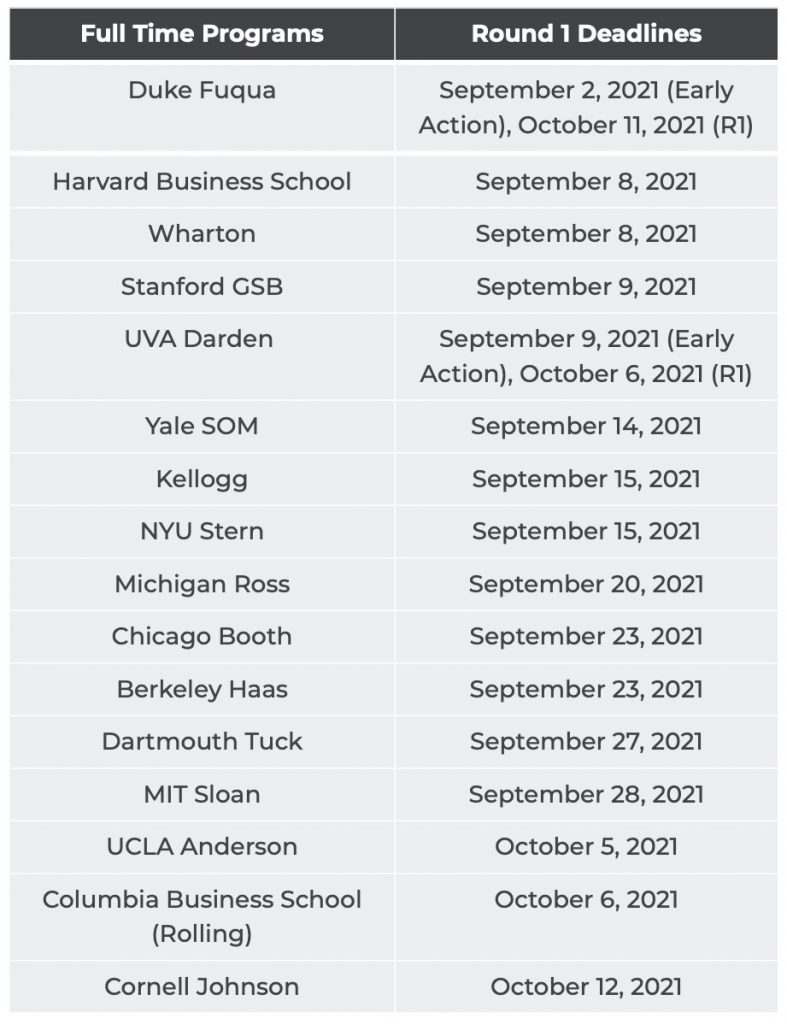 While the MBA essays may get the bulk of your attention, other crucial application components require significant effort, including short answer questions, optional essays and MBA videos. This means it is time to kick your efforts into high gear—especially since Personal MBA Coach never advises waiting until the last minute to hit submit. Below, get Personal MBA Coach’s advice on how to tackle each. Take your time filling out the short answer application questions. Do not underestimate the importance of short-answer MBA application questions. Applicants should set aside adequate time to perfect these answers, particularly since many schools, including HBS, have lengthy short answer sections that will require significant time. These questions serve a few important purposes. First, they allow you to share additional aspects of your candidacy. Naturally, you cannot cover all of your accomplishments and traits in your application essays; the short answer section is your chance to share these important successes. The format of the short answer section also allows admissions committee members to easily compare you to your peers. Ensure you take the time to stand out by carefully selecting the accomplishments discussed. Wherever possible, these answers should be complementary and not repetitive. Finally, short answer MBA application questions are a test of consistency and cohesion. The voice used here should match that shared throughout your essays and should paint a credible and concrete image of who you are as a candidate.  Consider whether you should complete any optional essays. Most schools offer candidates the chance to complete an optional essay. However, DO NOT feel compelled to answer these questions. In most instances, Personal MBA Coach advises only candidates with extenuating circumstances to provide additional information here. Such extenuating circumstances include low GPAs, gaps in employment and an unusual choice of recommenders (i.e., not asking a direct supervisor). Keep in mind that you should be brief and to the point with these essays. Do not offer long-winded excuses or any more information than is needed. Record MBA videos where applicable. Increasingly, top programs use the MBA video essay to assess applicants. After all, you will have limited career success if you are unable to nail an interview, so this is the admissions committee’s way of evaluating your physical presence and delivery. For some schools, such as MIT Sloan, the video question is provided in advance and applicants submit a pre-recorded video with their applications. For other schools, including Kellogg and Texas McCombs, the applicants receive some or all of the questions in advance but record the video on the spot. Finally, schools including Yale SOM and INSEAD do not share the video question in advance, requiring applicants to record videos on the spot within two days to one week after submitting their applications. For these statements, be yourself. An MBA video essay gives admissions committee members the chance to learn more about you on a personal level. Potential topics include goals, passions, values and hobbies, among other more challenging questions.  While you do not want to sound overly rehearsed, it is important to practice for these MBA videos. If you have the question beforehand, write out a rough script in advance of filming. If you do not, practice sample questions. As you practice, consider factors such as audio quality, demeanor, and fluency in addition to the content itself. Personal MBA Coach has proprietary software and a list of prior questions asked to help candidates prepare for these videos. We also include an analysis of sample videos in our comprehensive packages. Do not forget to proofread. Of course, applicants should also set aside sufficient time to proofread their MBA applications. Personal MBA Coach encourages candidates to get someone who is unfamiliar with their applications to do a thorough review. For those working with us, our expert proofreaders review clients’ applications at the final stage to ensure they are fully ready to submit. About Personal MBA Coach: Founded by a Wharton MBA and MIT Sloan graduate who sits on the Association of International Graduate Admissions Consultants Board of Directors, Personal MBA Coach has been guiding clients for 14 years and is consistently ranked #1 or #2 by leading sources including Poets&Quants. We help clients with all aspects of the MBA application process including early planning, GMAT/GRE/EA tutoring, application strategy, school selection, essay editing and mock interviews. Our team includes former M7 admissions directors and former M7 admissions interviewers. Last year, our clients earned more than $6.5M in scholarships! The post Short Answer Questions, Optional Essays and MBA Videos appeared first on Personal MBA Coach. |

| FROM Personal MBA Coach: The Clock Is Ticking for Round 1 MBA Deadlines |
As round one MBA application deadlines rapidly approach, Personal MBA Coach is here to help keep you on track. For some top business schools, you have just two weeks left. For others, there is still a bit of time to perfect your essays. However, that window is quickly closing.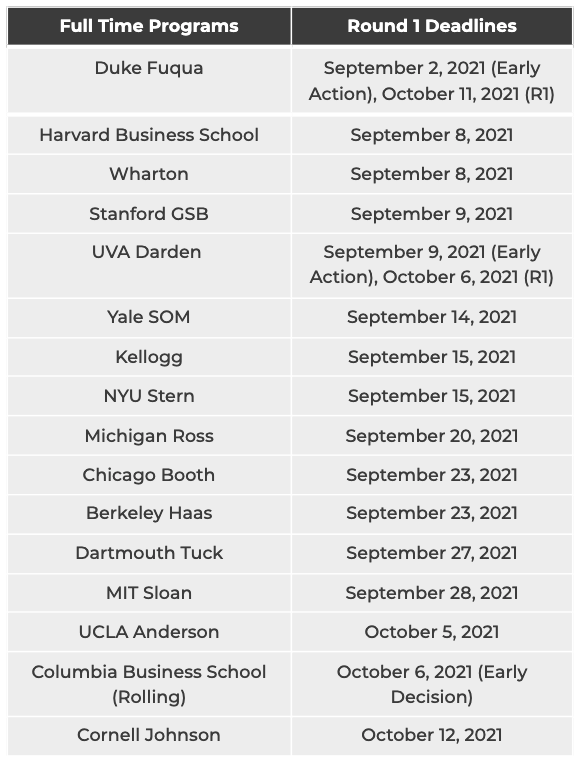 Most candidates fall into one of three categories. If one of the following describes you, check out these tips to discover your best action plan. My applications are nearly ready to go! If you read our blog Are You Ready for Round 1 Deadlines? and answered “yes” to all of the questions, then congratulations! For those who fall into this category, now is the time to dot your i’s and cross your t’s. Read through the requirements for each school you are applying to once again. Pay attention to smaller items such as short-term career goal statements, added videos and specific resume formatting requirements. Then, be sure to check off each element for each school. It is easy for something to fall through the cracks. Reach out to your recommenders to see if they have submitted their letters of recommendation. If they have not, ask if you can provide any additional information to expedite the process. Naturally, first focus on the school with the earliest MBA deadline and review the application holistically. Personal MBA Coach’s expert proofreaders look at all components of a completed application together.  My applications are done but I have concerns. If you have doubts after reviewing our blog on round 1 deadlines, your ideal action plan is less straightforward and will differ by school. You may consider applying to programs across two different rounds. For some schools, particularly those with early September MBA application deadlines, you likely do not have time to make any major changes. Plus, rushed last-minute changes often lead to mistakes. For most schools, there is little disadvantage to waiting until round 2. In fact, if waiting gives you more time to settle into a new job, finish a major project, re-take the GMAT/GRE or secure a promotion, this could work in your favor. Some schools even had higher admit rates in round 2 last year! However, there are other schools where your odds of success are considerably higher during round 1 or the early decision round. For those schools, particularly if the MBA deadlines are in October, you should consider whether you can make the necessary improvements in time. By narrowing your round 1 list and focusing on fewer schools, your odds of success will improve. Then you can take extra time to perfect your other applications in round 2. Personal MBA Coach Offers gut checks and comprehensive packages to help.  I am really behind on my applications. If, despite your best intentions, you have not started writing your essays, you may have missed the window for round 1 MBA application deadlines. With few exceptions, if you have not yet made a considerable dent in your applications, you should consider waiting until round 2. When applicants ask Personal MBA Coach when they should apply, we nearly always say it is best to do so when your application will be the strongest. An application thrown together in two weeks is not likely to fit the bill. In fact, we tell our clients that we should be doing little to no editing in the last 2 weeks. This is the time to proofread and ensure your story flows together. If you find that this third scenario applies to you, do not worry. Our comprehensive packages will help keep you on track and set you up for success in round 2. About Personal MBA Coach: Founded by a Wharton MBA and MIT Sloan graduate who sits on the Association of International Graduate Admissions Consultants Board of Directors, Personal MBA Coach has been guiding clients for 14 years and is consistently ranked #1 or #2 by leading sources including Poets&Quants. We help clients with all aspects of the MBA application process including early planning, GMAT/GRE/EA tutoring, application strategy, school selection, essay editing and mock interviews. Our team includes former M7 admissions directors and former M7 admissions interviewers. Last year, our clients earned more than $6.5M in scholarships! The post The Clock Is Ticking for Round 1 MBA Deadlines appeared first on Personal MBA Coach. |

| FROM Personal MBA Coach: A Look into Top STEM MBA Programs |
|
Over the past few years, all of the top US business schools have achieved STEM designation. By identifying their MBA programs as STEM degrees, business schools give international students the opportunity to remain in the US for an extra 2 years post-graduation and gain training via work experience. These programs benefit domestic students as well, equipping them with the skills to excel in business and tech and stand out to potential employers. So, how do STEM MBA programs differ from traditional full-time programs? While some business schools’ full-time MBA programs are STEM-designated without any curriculum changes, other schools now offer specific specializations. Below, get a glimpse into these unique STEM MBA opportunities. Harvard Business School Harvard’s MS/MBA: Engineering Sciences Program is designed for those with undergraduate degrees in engineering, computer science, or a related technical field.
 Kellogg Kellogg’s Management Science major qualifies as a STEM-designated field of study that prepares students to both manage and direct analyses to improve decisions.
Along with its STEM-designated full-time MBA, NYU Stern also offers a Tech MBA program. The Andre Koo Tech MBA is a one-year STEM MBA program that gives students a foundation in business and allows them to graduate with a focus in technology.
Cornell’s one-year Tech MBA program is STEM-designated. With the majority of the program based at Cornell Tech in New York City, students have access to a rapidly growing tech sector.
 USC Marshall The USC Marshall IBEAR MBA provides a STEM track for MBA hopefuls. The one-year program is designed for globally focused mid-career professionals.
Along with helping international students, STEM classifications are attractive to future employers across the board. STEM graduates can also expect to receive higher salaries compared to traditional MBA graduates! Need help with your applications? Each year, Personal MBA Coach helps clients advance their careers by pursuing a variety of specialized MBA programs. About Personal MBA Coach: Founded by a Wharton MBA and MIT Sloan graduate who sits on the Association of International Graduate Admissions Consultants Board of Directors, Personal MBA Coach has been guiding clients for 14 years and is consistently ranked #1 or #2 by leading sources including Poets&Quants. We help clients with all aspects of the MBA application process including early planning, GMAT/GRE/EA tutoring, application strategy, school selection, essay editing and mock interviews. Our team includes former M7 admissions directors and former M7 admissions interviewers. Last year, our clients earned more than $6.5M in scholarships! The post A Look into Top STEM MBA Programs appeared first on Personal MBA Coach. |

| FROM Personal MBA Coach: Kicking Off Round 2 MBA Applications |
Whether you are not quite ready for round 1 deadlines or have always been a round 2 applicant, it is time to focus on your business school applications now that summer is behind us. While MBA round 2 deadlines may seem far off, Personal MBA Coach advises that all round 2 applicants get started today.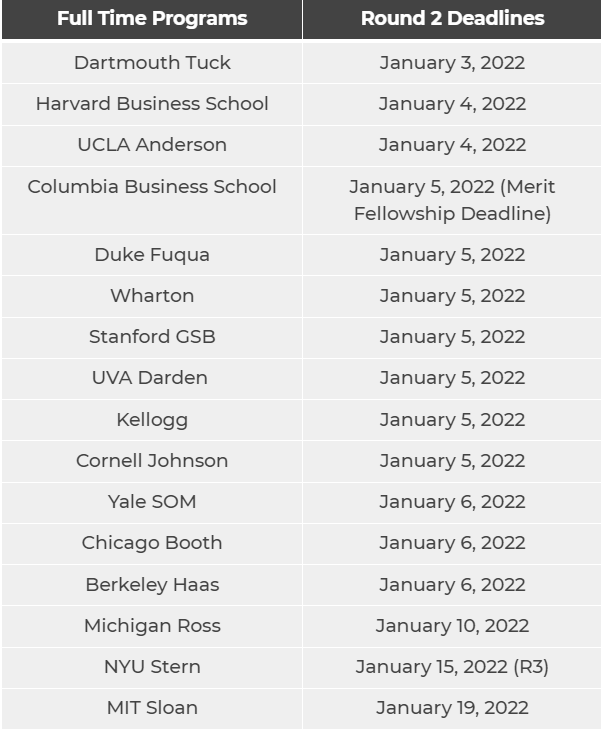 Below are 5 steps you should begin taking now (even before you begin drafting your application essays). 1) Narrow down your school list and schedule campus visits if possible Research the programs that best fit with your long-term goals and ideal learning environments. Pay careful attention to each school’s culture and the industries where its graduates are most often placed. Make sure that you have some “reach” schools, some “more likely” schools and some “safer” schools, especially if you want to ensure you get in this time around. Personal MBA Coach’s average candidate applies to 5 to 8 schools, and it is important that you have a well-rounded list. Next, if it is realistic based on your location, work schedule and COVID-19 restrictions, you should try to visit the campus before applying. If a campus is not open to visitors or an in-person visit is not practical for you, consider attending virtual tours and events. Whether or not you are able to visit, look for current students or alumni in your immediate or extended networks and take the time to talk to them now! Learn about their experiences, what sets their programs apart, etc. These days, there are many virtual opportunities to connect with students and alumni as well. 2) Fine-tune and articulate your career goals Most business school applications will ask you to think about your career goals. This is a very important question, and you should give it serious thought before MBA round 2 deadlines begin to approach. Admissions directors want to know how you will make the business world better when you leave their campuses and what your unique mark will be. The best career essay will do two things:
Need help articulating your goals? Visit our blog on MBA goals for additional guidance!  3) Think about your personal story We devote the first part of each engagement with candidates to crafting a winning personal story. This is the most important part of the MBA application, and it can also be the hardest. We advise our candidates to start this process months, if not years, in advance! The good news is that everyone has a personal story. So, what should you include in your personal story? This will differ for every candidate but across the board we can tell you, not everything! No one wants to read 1,000+ words with a chronological flow of your life. Instead, you must be focused, logical and unique. This is also not the time to tell the admissions committee what you think they want to hear. Instead, think about what is most important to you, what drove your career and personal decisions and what connects these all together. No candidate is perfect; instead, we chart the best course we can with the hand we were dealt, and the best essays show this. To find out how to craft a compelling personal story, check out this blog. 4) Select and prepare your recommenders Selecting the right recommenders is a very important part of the application process. It can be tempting to select the person with the most prestigious resume or the easiest person to discuss your business school plans with. Personal MBA Coach encourages you instead to carefully weigh your options and choose recommenders who know you best, can write great letters and can compare you to other applicants (more on this here). Once you have selected the right person, you also have to prepare them carefully. We often hear of candidates who ask someone to write the letter, ensure it gets submitted and call it a day. This can be a big mistake! Your role in the LOR process should be much more involved than this, so do not plan on leaving LOR preparation until right before MBA round 2 deadlines. Read our tips on preparing your recommenders to learn more.  5) Customize your MBA resume A business school resume differs from a professional one. These resumes accomplish two different goals. For a professional resume, you want to show potential employers that you have the specific skills and experiences they are looking for. You are selling your ability to do the job. For an MBA resume, on the other hand, you want to show how you have been successful and have demonstrated leadership. You are selling your future potential. Find out how to craft a compelling MBA resume here. About Personal MBA Coach: Founded by a Wharton MBA and MIT Sloan graduate who sits on the Association of International Graduate Admissions Consultants Board of Directors, Personal MBA Coach has been guiding clients for 14 years and is consistently ranked #1 or #2 by leading sources including Poets&Quants. We help clients with all aspects of the MBA application process including early planning, GMAT/GRE/EA tutoring, application strategy, school selection, essay editing and mock interviews. Our team includes former M7 admissions directors and former M7 admissions interviewers. Last year, our clients earned more than $6.5M in scholarships! The post Kicking Off Round 2 MBA Applications appeared first on Personal MBA Coach. |

| FROM Personal MBA Coach: How to Prepare for the Executive Assessment |
|
In recent years, the Executive Assessment has grown in popularity. While the GMAT and GRE remain the two more widely accepted MBA admissions exams, many top business schools have started to welcome the Executive Assessment test. Wondering if the Executive Assessment is the right option for you? Below, Personal MBA Coach explores how to prepare for the Executive Assessment and what sets it apart. What Is the Executive Assessment Test? The Executive Assessment, also referred to as the EA, was originally designed for experienced professionals interested in pursuing advanced education. Therefore, it is most often used by those applying to Executive MBA programs. In recent years, however, some full-time and part-time programs have started to accept the EA. The 90-minute exam aims to assess the skills and knowledge of experienced professionals and evaluate business school readiness as a whole. Test takers receive results for each section of the Executive Assessment: Integrated Reasoning, Quantitative Reasoning, and Verbal Reasoning, as well as a total result ranging from 100 to 200, which is determined by the results on the three sections. While Executive Assessment score percentiles are not released, according to Poets&Quants, a score of 150 is about the 50th percentile.  How Does the Executive Assessment Differ from the GMAT and GRE? Unlike the GMAT and GRE, candidates can only take the Executive Assessment test up to two times. Given the limited number of times that you can take the test, Graduate Management Admission Council does not permit you to cancel your scores. The EA Online can also be taken up to two times. That said, if you do not want your EA scores sent to your target schools, GMAC suggests that you do not select any schools or programs before your appointment. You can instead add more schools or programs to a score appointment afterwards. The Executive Assessment is also a shorter test so if you have limited time, you may want to explore whether the EA could be right for you. What Should Executive Assessment Prep Entail? Personal MBA Coach offers customized one-on-one Executive Assessment prep. In fact, we were one of the first companies to provide Executive Assessment test preparation services. If you are wondering how to prepare for the Executive Assessment, we find one of the best things to do is to write out a study plan so you can stick to a schedule. Be honest with yourself in terms of how much time you can dedicate to studying. We strongly encourage test takers to familiarize themselves with the structure and content of the assessment. With 30 minutes to complete each of the three sections of the test, time management is a must. Completing practice tests with a timer can help you get comfortable with the 90-minute timeframe. If you are looking for guidance, our dedicated Executive Assessment tutor can provide you with the skills necessary to ace the exam. Our Executive Assessment MBA private tutoring sessions are currently conducted remotely via Zoom, Skype and our whiteboard sharing software. As with all of Personal MBA Coach’s services, satisfaction is guaranteed with our Executive Assessment prep.  What Schools Accept the Executive Assessment? Currently, Berkeley Haas, Chicago Booth, Columbia Business School, Duke Fuqua, INSEAD, London Business School, MIT Sloan, Kellogg, NYU Stern, UCLA Anderson, UVA Darden, Wharton and Yale SOM are among the top programs that accept the Executive Assessment test for EMBA candidates. In certain cases, applicants must have a certain amount of work experience to submit the EA. For instance, Wharton requires EMBA candidates to have at least 8 years of work experience by the start of the program if they want to opt for the Executive Assessment. Columbia Business School, Duke Fuqua, MIT Sloan, NYU Stern, and UVA Darden also accept EA scores for full-time MBA applicants. Looking for help with the test prep process? Whether you are studying for the GMAT, GRE or EA, Personal MBA Coach is here to help you reach your goals. Visit our tutoring services to begin raising your score today! About Personal MBA Coach: Founded by a Wharton MBA and MIT Sloan graduate who sits on the Association of International Graduate Admissions Consultants Board of Directors, Personal MBA Coach has been guiding clients for 14 years and is consistently ranked #1 or #2 by leading sources including Poets&Quants. We help clients with all aspects of the MBA application process including early planning, GMAT/GRE/EA tutoring, application strategy, school selection, essay editing and mock interviews. Our team includes former M7 admissions directors and former M7 admissions interviewers. Last year, our clients earned more than $6.5M in scholarships! The post How to Prepare for the Executive Assessment appeared first on Personal MBA Coach. |

| FROM Personal MBA Coach: Personal MBA Coach’s Take on the Bloomberg Businessweek MBA Rankings |
|
Bloomberg Businessweek recently released its list of the 2021-2022 best business schools, ranking 119 business schools in the US, Europe, Asia-Pacific, and Canada. This year, rankings were based on surveys from students, alumni, and recruiters, as well as compensation and employment information. United States business schools also provided diversity statistics on race, ethnicity, and gender. Personal MBA Coach would like to share our thoughts on the latest Bloomberg Businessweek MBA rankings and business school rankings in general. While the Bloomberg MBA rankings were suspended in 2020 due to the coronavirus, many of this year’s results closely resemble the 2019-2020 rankings. That said, there are also a few surprises. The United States Bloomberg MBA Rankings Yet again, Stanford GSB topped the US rankings. As one student shared, what makes the program so strong are the “incredible resources and opportunities available…including the highly accessible and accomplished professors, so many responsive and receptive alumni, amazing classmates, and full access to the broader Stanford ecosystem.” Dartmouth Tuck once again takes second place in the US Bloomberg MBA rankings. Also matching their previous performance, Harvard Business School secured the #3 position and Chicago Booth placed 4th. This year, Kellogg jumped considerably from #10 to #5 and Columbia Business School moved from #9 to #6. UC Berkeley placed 7th, followed by MIT Sloan in 8th place, and Wharton and UVA Darden, which tied for 9th. These are interesting shifts for Darden and Wharton, considering they placed 5th and 6th in the previous rankings. [img]https://www.personalmbacoach.com/wp-content/uploads/2021/09/WordPress-–-Bloomberg-Businessweek-MBA-Rankings-Blog-1.png[/img] The European Bloomberg MBA Rankings As in the past Bloomberg MBA rankings, IMD has secured 1st place in the 2021-2022 rankings for European schools. Both noteworthy changes, IESE ascended from #6 to #2 and SDA Bocconi moved from #5 to #3. HEC Paris came in 4th place this year and London Business School rounded out the top 5. IE took 6th place, Cambridge Judge took 7th, and Oxford Said took 8th. HEC Paris (#9) and Manchester (#10) finished up the top 10. While HEC Paris and LBS fell slightly in this year’s rankings, Oxford Said and Manchester had not been in the previous top 10 list. The Asia-Pacific MBA Rankings As in the 2019-2020 rankings, CEIBS took 1st place in the Asia-Pacific rankings, HKUST came in 2nd, and National University of Singapore came in 3rd. Shanghai University of Finance and Economics shifted from #5 to #4, whereas Indian School of Business moved from #4 to #5. Indian Institute of Management Bangalore made it into the top ten this year, coming in 6th and Shanghai University MBA Centre concluded the Asia-Pacific schools in 7th place. This year, Lingnan was omitted from the Asia-Pacific Bloomberg MBA rankings, while IIM Bangalore made it onto the list. The Canadian Bloomberg MBA Ranking The Bloomberg Businessweek MBA rankings include only five Canadian MBA programs this year. Smith jumped from #2 to #1 and HEC Montreal moved significantly from #6 to #2. Rogers School of Management moved from #5 to #3 and McGill shifted from #7 to #4. Rounding out the top 5, Molson dropped one position from 4th to 5th place in this year’s list. It comes as a surprise that Rotman and Ivey are not on the current list. Alberta also was missing from this year’s Bloomberg Businessweek MBA rankings. [img]https://www.personalmbacoach.com/wp-content/uploads/2021/09/WordPress-–-Bloomberg-Businessweek-MBA-Rankings-Blog-3.png[/img] How to Think About MBA Rankings Exploring MBA rankings can be a great way to build your target school list, though remember that almost every ranking source will give different results. Plus, as Personal MBA Coach has shared in the past, you should pay attention to a school’s average ranking over time and not be overly concerned by year-to-year fluctuations. This year’s surprises and shifts are additional reminders of the value (for some applicants) of broadening your school list beyond the M7 programs. Depending on your post-MBA goals, you may also want to pay more attention to some of the specialized rankings that exist and school specific placement statistics. Just because a school is higher ranked does not mean that it will do a better job at preparing you for your next job, especially if you are targeting a more niche industry. Finally, with the lines blurring between top schools, available financing should be a key consideration. You may be able to secure more substantial funding from one school vs. another: last year, our clients earned over $6.5M in scholarships. Often you will be better served selecting a school with a slightly lower ranking but a more favorable financial package. Some M7 schools are very generous with scholarships and others are not. As a reminder, do not overreact to these new rankings but do keep an open mind about expanding your MBA list. Need help building a target school list? Personal MBA Coach is here to help! Visit our comprehensive packages to learn more. About Personal MBA Coach: Founded by a Wharton MBA and MIT Sloan graduate who sits on the Association of International Graduate Admissions Consultants Board of Directors, Personal MBA Coach has been guiding clients for 14 years and is consistently ranked #1 or #2 by leading sources including Poets&Quants. We help clients with all aspects of the MBA application process including early planning, GMAT/GRE/EA tutoring, application strategy, school selection, essay editing and mock interviews. Our team includes former M7 admissions directors and former M7 admissions interviewers. Last year, our clients earned more than $6.5M in scholarships! The post Personal MBA Coach’s Take on the Bloomberg Businessweek MBA Rankings appeared first on Personal MBA Coach. |

| FROM Personal MBA Coach: How to Approach the Top MBA Essays |
|
While there are an increasing number of compelling MBA programs around the world, with impressive rankings and strong alumni networks, the M7 schools continue to be attractive choices for MBA hopefuls. For those planning on applying to one or more of the M7 schools, Personal MBA Coach is here to help you navigate the essay-writing process. Accessible to all Personal MBA Coach newsletter subscribers, our free M7 Essay Analysis e-book features our exclusive guidance on how to approach the 2021-2022 application essays for each of the M7 business schools. Below, Personal MBA Coach shares the required essay questions for all of the M7 schools, as well as our tips for how to respond successfully to these top MBA essays! Stanford GSB Essays Number of Required Essays: 2 Essay 1: What matters most to you, and why? (650 words suggested) Personal MBA Coach’s Tips: Take considerable time to reflect upon what you are most passionate about. In an ideal scenario, you have acted on this passion and it is reflected in more than one aspect of your life. Think carefully about why this passion is important to you, and do not forget the WHAT here. At the end of the day, a cause or passion that you have done nothing with will not resonate strongly with the admissions committee (or be very believable). Essay 2: Why Stanford? (400 words suggested) Personal MBA Coach’s Tips: For this second Stanford GSB essay, start by setting up you why you want an MBA, including your goals and the skills needed to make these goals a reality. Then, make it clear how Stanford will specifically help you fill these skill gaps, mentioning classes, clubs, and programs that interest you. Do not forget to detail what draws you to Stanford’s culture as well! Wharton Essays Number of Required Essays: 2 Personal MBA Coach suggests that you consider each Wharton essay individually while also making sure that your two responses complement one another. Essay 1: How do you plan to use the Wharton MBA program to help you achieve your future professional goals? You might consider your past experience, short- and long-term goals, and resources available at Wharton. (500 words) Personal MBA Coach’s Tips: The first Wharton essay gives applicants the opportunity to reflect on their high-level aspirations. As you consider your future, think about your skill gaps and how attending Wharton will enable you to close these gaps. Cover the opportunities you want to avail yourself of on campus and be sure to demonstrate a clear understanding of Wharton’s culture. Essay 2: Taking into consideration your background – personal, professional, and/or academic – how do you plan to make specific, meaningful contributions to the Wharton community? (400 words) Personal MBA Coach’s Tips: This second MBA essay question gives candidates a chance to showcase previous accomplishments and potential contributions to the Wharton community. Applicants can choose from impressive extracurricular accomplishments, specific talents, and/or distinct professional skills. A powerful response will highlight multiple contributions that clearly unite your personal story, career goals, and passions! [img]https://www.personalmbacoach.com/wp-content/uploads/2021/09/WordPress-–-How-to-Approach-the-Top-MBA-Essays.png[/img] Harvard Business School Essay Number of Required Essays: 1 Essay: As we review your application, what more would you like us to know as we consider your candidacy for the Harvard Business School MBA Program? (No word minimum or maximum) Personal MBA Coach’s Tips: The HBS essay is an invitation to reveal what is truly interesting about you and let the admissions committee “meet” the person behind your MBA application. That said, responses will vary significantly for everyone. Do not try to write what you think the admissions committee wants to read. Instead, consider the unique value that you will add to the HBS community. Strong essays often share a detailed personal story, or at least some kind of personal anecdote, which is usually tied to a recurring theme within your HBS essay. MIT Sloan Cover Letter Rather than asking applicants to submit a standard MBA essay, MIT Sloan requests that candidates submit a cover letter: Cover Letter: Please submit a cover letter seeking a place in the MIT Sloan MBA program. Your letter should conform to a standard business correspondence, include one or more professional examples that illustrate why you meet the desired criteria above, and be addressed to the Admissions Committee (300 words or fewer, excluding address and salutation). Personal MBA Coach’s Tips: Here, applicants must think about their most noteworthy accomplishments, making it clear what they will bring to the Sloan community. Approach the MIT Sloan cover letter as you would approach any other professional cover letter. This means that you must tell the reader who you are and specifically ask for a place in the MIT Sloan class. Chicago Booth Essays Number of Required Essays: 2 Essay 1: How will the Booth MBA help you achieve your immediate and long-term post-MBA career goals? (250 words minimum) Personal MBA Coach’s Tips: This first Chicago Booth essay is a standard goals question. Think about your short- and long-term goals, highlighting how you developed these goals and what your higher-level aspirations are. Do not forget to think about your skill gaps and how a Booth MBA will help you achieve your post-MBA goals. You will want to detail the classes, programs, or clubs that you hope to take advantage of. Essay 2: An MBA is as much about personal growth as it is about professional development. In addition to sharing your experience and goals in terms of career, we’d like to learn more about you outside of the office. Use this opportunity to tell us something about who you are… (250 words minimum) Personal MBA Coach’s Tips: This MBA essay prompt encourages candidates to reflect upon the personal aspects of their profile. Use this as your opportunity to show what differentiates you from other applicants. Possible topics to cover include values, passions, extracurricular activities, and hobbies. Kellogg Essays Number of Required Essays: 2 Essay 1: Kellogg’s purpose is to educate, equip and inspire brave leaders who create lasting value. Provide a recent example where you have demonstrated leadership and created value. What challenges did you face and what did you learn? (450 words) Personal MBA Coach’s Tips: While most share a professional story for this first question, leadership examples in your extracurriculars could also work here. A successful response for this Kellogg essay will showcase your strengths and specific skillsets. Essay 2: Values are what guide you in your life and work. What values are important to you and how have they influenced you? (450 words) Personal MBA Coach’s Tips: The second Kellogg essay question can be challenging, as it forces applicants to reflect on what really drives and motivates them. For each value that you select, explain WHY this value is important to you and demonstrate HOW this value is reflected in your life. [img]https://www.personalmbacoach.com/wp-content/uploads/2021/09/WordPress-–-How-to-Approach-the-Top-MBA-Essays-3.png[/img] Columbia Business School Essays Number of Required Essays: 3 The first Columbia MBA essay is required while candidates have a choice for essays 2 and 3: Essay 1: Through your resume and recommendations, we have a clear sense of your professional path to date. What are your career goals over the next 3 – 5 years and what, in your imagination, would be your long-term dream job? (500 words) Personal MBA Coach’s Tips: This Columbia Business School essay prompt enables you to show how you envision your career unfolding. The school asks for a short- and long-term dream job so make sure you include both. Although candidates should have lofty goals here, these goals should also align with their short-term goals and story as a whole. Essay 2 and 3: Please respond to two (2) of the three (3) essay questions listed below: The Phillips Pathway for Inclusive Leadership (PPIL) is a new co-curricular program designed to ensure that every CBS student develops the skills to become an ethical and inclusive leader. Through PPIL, students attend programming focused on five essential diversity, equity, and inclusion skills: Creating an Inclusive Environment, Mitigating Bias, Communicating Across Identities, Addressing Systemic Inequality, and Managing Difficult Conversations. Tell us about a time you were challenged around one of these five skills. Describe the situation, the actions you took, and the outcome. (250 words) Personal MBA Coach’s Tips: This initial choice is a topic that is extremely pertinent to all top business schools. If you have a powerful response to share, Personal MBA Coach suggests that you take advantage of this prompt. On the other hand, do not force this essay if you do not have an authentic story to tell. Why do you feel Columbia Business School is a good fit for you? (250 words) Personal MBA Coach’s Tips: This second option directly addresses fit. This is the perfect opportunity to talk about the classes, clubs, and additional programs that interest you, such as speaker series and immersion seminars. Essay 4: Tell us about your favorite book, movie, or song and why it resonates with you. (250 words) Personal MBA Coach’s Tips: This final Columbia Business School essay question provides the chance to share something unique about your profile. To get started, think about your hobbies, passions, values, or upbringing. Then choose a book, movie, or song that ties to your own experience(s). As Personal MBA Coach often says, the WHAT matters less than the WHY here. Instead of selecting something to impress the reader, choose something that genuinely resonates with you. For more guidance on the top MBA essays, download Personal MBA Coach’s M7 Essay Analysis e-book! About Personal MBA Coach: Founded by a Wharton MBA and MIT Sloan graduate who sits on the Association of International Graduate Admissions Consultants Board of Directors, Personal MBA Coach has been guiding clients for 14 years and is consistently ranked #1 or #2 by leading sources including Poets&Quants. We help clients with all aspects of the MBA application process including early planning, GMAT/GRE/EA tutoring, application strategy, school selection, essay editing, and mock interviews. Our team includes former M7 admissions directors and former M7 admissions interviewers. Last year, our clients earned more than $6.5M in scholarships! The post How to Approach the Top MBA Essays appeared first on Personal MBA Coach. |

| FROM Personal MBA Coach: Nailing the Virtual HBS Interview |
|
Harvard Business School interview invitations were just released. If you were fortunate enough to be selected, now comes the challenging part: understanding how to prepare for the HBS interview. The MBA interview is an incredibly important component of the application process, and it is critical that you adequately prepare. Wondering where to begin? Personal MBA Coach is well versed in the intricacies of the MBA interview process. This year, HBS interviews are again virtual, which means HBS candidates have to consider both how to prepare for the HBS interview AND how to nail a virtual interview. Personal MBA Coach has tips for both! Should you want additional support, our team of former M7 interviewers conduct mock interviews every year for all of the top business schools. Clients who use our MBA interview preparation services see a 70-85% conversion rate! What should you expect from the HBS Interview? While many other top programs have “blind” interviews where the interviewer has only your resume, Harvard Business School interviewers read your entire application and come prepared with very specific questions to ask. HBS interviews can often be 2 on 1, which means you may have two interviewers asking you questions at the same time or more likely one interviewer and one observer. Do not be caught off guard by this and be sure to make eye contact with each interviewer equally. While always only 30 minutes long, HBS interviews are challenging. In fact, out of all of the top MBA interviews, the HBS interview is one of the hardest. How should I prepare for the HBS Interview? As with any interview, practice is key! You may wonder what they will ask. It depends on your application and unique situation. At Personal MBA Coach, our team of admissions directors and interviewers predicts the most likely questions to be asked. In fact, each interview is pretty unique for us, which is a departure from the normal process of asking common interview questions. This means you will want to know your resume from top to bottom and be ready to clearly explain your goals and why you want an MBA. You also should be prepared to talk about weaknesses in your application and/or any gaps or inconsistencies. For example, if you decided to switch industries mid-career, be sure that you have a logical and well-thought-out explanation. Everything is fair game! [img]https://www.personalmbacoach.com/wp-content/uploads/2021/10/WordPress-–-HBS-Interview-Blog-1.png[/img] In addition to knowing your resume cold, prepare your stories in advance. We find that bulleting is most effective here. This way you can note the skills you want to highlight and will be prepared to pivot your stories as needed. You should be able to adapt four to five stories to cover most top questions. For instance, a story about stepping up in the office could be applicable to a question about a time you had an innovative idea OR a question about a time you helped a coworker. Try to assign your stories to possible questions in advance. Avoid spending too much time setting up the scene. Instead, stick to the main steps you took and how you excelled in each example. It can be helpful to break your stories into situations, actions, and results. You also should ensure you can articulate your MBA goals. Be prepared to explain, clearly and concisely, what you hope to accomplish in your career, why you are interested in this path, and how you will be successful. Prepare specific examples that you can use to back up these plans. If you need help articulating your MBA goals, check out Personal MBA Coach’s blog here. As you share these goals, make sure you are expressing excitement. Since you do not have the full range of bodily nonverbal cues that you would have in person, you want to make sure you are enthusiastic during virtual interviews. See our expert tips, below. What is the HBS post-interview reflection and how should I approach it? Unique to HBS, applicants are asked to submit a written reflection, due within 24 of completing your interview. This reflection offers candidates to chance to share how they felt the interview went, discuss what they enjoyed about the experience and provide any additional perspective they wish they had shared at the time. Be sure to use this opportunity to reflect on the interview itself! Do not consider this an additional essay or the time to discuss new aspects of your profile. Personal MBA Coach recognizes this is a challenging task and offers all HBS comprehensive clients and HBS interview preparation clients individual support on the HBS post-reflection. [img]https://www.personalmbacoach.com/wp-content/uploads/2021/10/WordPress-–-HBS-Interview-Blog-3.png[/img] What advice do you have for virtual interviewing? To help you prepare for some of the unique challenges of a virtual interview, Personal MBA Coach reached out to former MBA Admissions Interviewers on our team for their top tips!
Our clients have told us this is one of the most worthwhile steps they have taken to enhance their candidacy, helping them build the confidence they need to excel in the interview. When it came time to interview, Scott set me up with his interviewing experts, who thoroughly prepared me for each interview. I ended up getting into every single school that I applied to with many full rides, and am now in the position to choose between Stanford, Harvard, and Wharton. Scott’s expertise, dedication, transparency, and most importantly, patience, allowed for my lofty goals to become a reality. – Harvard Business School Admit Scott is a great coach. He helps students select the right schools and his interview prep services are fantastic. I felt so comfortable in my interviews thanks to these sessions. – Harvard Business School Admit I worked with Personal MBA Coach on the interview preparation portion of my application to HBS. I can say honestly that without this interview preparation, I would not have been ready for the depth of questions I was asked in my actual HBS interview. This package was a critical part of my preparation, and allowed me to go into the interview feeling confident and prepared. Scott was always just a quick email away if I needed anything, and his service was a key factor in my preparation that ultimately led to an HBS admission. I would recommend Scott and his team to any of my peers applying to business school. And can truly say it was 100% worth the money. Thank you Scott! – Harvard Business School Admit Find out more about our Harvard Business School interview preparation and post-reflection support here. As part of Personal MBA Coach’s HBS interview prep, we will review your entire application before your HBS interview. Then, your HBS interviewer will ask you very thorough questions, focusing on weak areas of your application or topics that are likely to be covered during your HBS interview. Are you also hoping to secure an interview invite from Wharton? Get a head start by taking a look at Personal MBA Coach’s advice on Wharton’s virtual TBD. About Personal MBA Coach: Founded by a Wharton MBA and MIT Sloan graduate who sits on the Association of International Graduate Admissions Consultants Board of Directors, Personal MBA Coach has been guiding clients for 14 years and is consistently ranked #1 or #2 by leading sources including Poets&Quants. We help clients with all aspects of the MBA application process including early planning, GMAT/GRE/EA tutoring, application strategy, school selection, essay editing, and mock interviews. Our team includes former M7 admissions directors and former M7 admissions interviewers. Last year, our clients earned more than $6.5M in scholarships! The post Nailing the Virtual HBS Interview appeared first on Personal MBA Coach. |

| FROM Personal MBA Coach: Top 10 Questions Asked of Admissions Directors – Answered |
|
I was fortunate to be a member of Columbia Business School’s admissions committee for nearly six years. During that time, I had the opportunity to participate in hundreds of events with prospective students, gaining a unique understanding of questions candidates most often ask of Admissions Directors. I am excited to be bringing that experience to Personal MBA Coach, sharing answers to the most common MBA applicant questions. 1) What does an MBA admissions committee view as an applicant’s most important quality? There is no magic characteristic that will make you an easy admit for a program. Every school will be looking for different qualities based on the school’s values and in an effort to build a diverse community. The committee will be considering several aspects of your candidacy when reviewing your application: Will you be successful in their academic environment? (This is typically evaluated using GPA and standardized test scores.) What qualities and expertise will you bring to the classroom and community, and have you expressed the inclination to share this with your peers? Business schools are looking for candidates with varying skill sets, but more importantly they are looking for candidates who understand how that will benefit the school’s community. MBA admissions committees will also look at your work experience to determine whether you have demonstrated the potential for leadership. Some schools will explicitly ask you for your post-MBA goals. In this case, committees are often evaluating whether your previous experience, paired with the school’s resources, will get you to where you want to be professionally. 2) What if I come from a non-traditional background? Top MBA programs (not to mention future employers) are increasingly recognizing the value of diversity of thought and expertise for the business school experience and the bottom line. This makes the MBA classroom a welcome place for those applying from less represented industries and functions. When applying with less traditional work experience, you will still be expected to submit a competitive test score because schools do not want to set you up for failure in the classroom. However, your unique accomplishments and expertise are often likely to help set you apart. Be sure to thoughtfully articulate the advantages of your unique experiences to the committee. 3) I have a low undergraduate GPA. Does this mean I am not competitive for top schools? Top business schools review applications holistically, meaning that they typically will not preclude an applicant solely due to a single criterion, such as GPA (within reason). That said, if your GPA is below the target school’s average, you want to focus on achieving a strong test score to help overcome this. The GMAT/GRE/EA offers a recent and standardized indication of your academic abilities, providing the committee with more confidence that you will succeed in the MBA classroom. Some schools will also consider your academic performance in a graduate program or supplemental coursework (e.g., Coursera or MBA Math). [img]https://www.personalmbacoach.com/wp-content/uploads/2021/10/WordPress-–-Top-10-Questions-Asked-of-Admissions-Directors.png[/img] 4) How important is my GMAT/GRE/EA score? The test score is really the only standardized indication of your academic abilities so it is important to put your best foot forward here. Do not be afraid to take the test multiple times as committees will typically view multiple attempts as a sign of your determination. The GMAT/GRE/EA also allows the admissions committee to stratify a large pool of candidates. Keep in mind that you are not applying in a vacuum, and you are being compared with other strong applicants applying during the same round. I would advise, especially if you are from an overrepresented background, to retake the test if you (1) are not yet above the average score for your target school and (2) feel that, with the proper preparation, you can improve your score. You cannot predict how strong the other applicants’ candidacies will be. 5) Does it help to attend admissions events or visit campus before applying? This engagement can be an important consideration based on your target schools. Every school evaluates your engagement with admissions differently. Some schools, such as Columbia and MIT, will observe whether you have attended admissions events (virtual, on, or off campus) to determine your level of interest in the program. For schools that consider this, you will want to make sure you attend at least a couple of events before applying. Other schools, like Harvard, do not track this; therefore, you should spend your time elsewhere when preparing the application. 6) Can I still work part-time while pursuing a full-time MBA? If you are asking if you can promise your boss that you will still be available part time to continue doing the work you were doing pre-MBA, then the answer is: This is highly discouraged and likely would not work in your favor. The first semester of an MBA program is incredibly busy with multiple competing priorities and little flexibility. You do not want to spread yourself thinner or you’ll miss out on the experience that you’re investing so much in. However, if squeezing in part-time internships during the semester is important to you, many schools have these types of opportunities, but you will have to do your research. For example, given Columbia’s location in Manhattan, students have copious opportunities to spend part of their week in an internship to broaden their experience and network in a given industry and/or function outside of the full-time summer internship experience. [img]https://www.personalmbacoach.com/wp-content/uploads/2021/10/WordPress-–-Top-10-Questions-Asked-of-Admissions-Directors-1.png[/img] 7) Whom should I ask to write my letters of recommendation? Pick recommenders you have worked closely with and who can speak to your leadership potential and the quality of your deliverables. An MBA admissions committee will not expect you to risk a bonus, promotion, or job by asking your direct supervisor if they are not supportive or aware of your plans. In this case, a dotted line manager, a project manager, or former manager either at your current or past employer are good options. If you are working for your family business, or own your own business and you are the boss, clients and other stakeholders often can write a strong recommendation for you. 8) I am a candidate from an overrepresented population, how can I make my candidacy stand out? The most objective way to stand out is to have stronger than average test scores. Once you have maximized your score, focus on aspects of the application you have control of, such as engagement with the school (if they value this) and developing a strong overall application. (If you are working with Personal MBA Coach early in the application process, you also can look into stepping up at work or through your extracurricular activities.) Think about how you can uniquely add value to your MBA peers and focus on what sets you apart. Another way to convince an MBA admissions committee that you are different from your peers with similar backgrounds is to specifically understand how you will contribute to the school and make those around you better. 9) How important is a culture fit for an applicant? Cultural fit is as important for you as it is for the admissions committee. You are going to thrive in a place that has the right opportunities and resources for you professionally, academically, and socially. An admissions committee will be able to evaluate your fit based only on the information you provide so, once again, do your research, and make sure you are clear about how your experiences, values, and goals align with what the school can offer in those three domains. Additionally, part of your “fit” will be evaluated by how you can contribute to the community, so as you are learning about a school’s culture, think about how your interests and expertise will complement the school’s. 10) Do I need to know what career I want to pursue when I apply to an MBA program? The short answer is no; however, the better question to ask would be whether your application needs to focus on a single professional short-term goal. In that case, yes, the best applications choose one goal to communicate to the committee. This makes for a clearer, more streamlined narrative when describing how you will engage with the school to achieve your professional goals. Keep in mind that committees will not follow you around with your goals essay and require that you pursue only the courses and resources related to it. Once you matriculate, you will be able to seek out coursework, events, and opportunities across industries and functions. About Personal MBA Coach: Nicole is a former Associate Director of Admissions at Columbia Business School, where she evaluated and interviewed MBA applicants globally from 2015 until early 2021. Founded by a Wharton MBA and MIT Sloan graduate who sits on the Association of International Graduate Admissions Consultants Board of Directors, Personal MBA Coach has been guiding clients for 14 years and is consistently ranked #1 or #2 by leading sources including Poets&Quants. We help clients with all aspects of the MBA application process including early planning, GMAT/GRE/EA tutoring, application strategy, school selection, essay editing, and mock interviews. Our team includes former M7 admissions directors and former M7 admissions interviewers. Last year, our clients earned more than $6.5M in scholarships! The post Top 10 Questions Asked of Admissions Directors – Answered appeared first on Personal MBA Coach. |


|
|
||